Inside Scoop: Anant Ambani and Radhika Merchant’s Grand Pre-wedding Festivities
- 16 Mar - 22 Mar, 2024
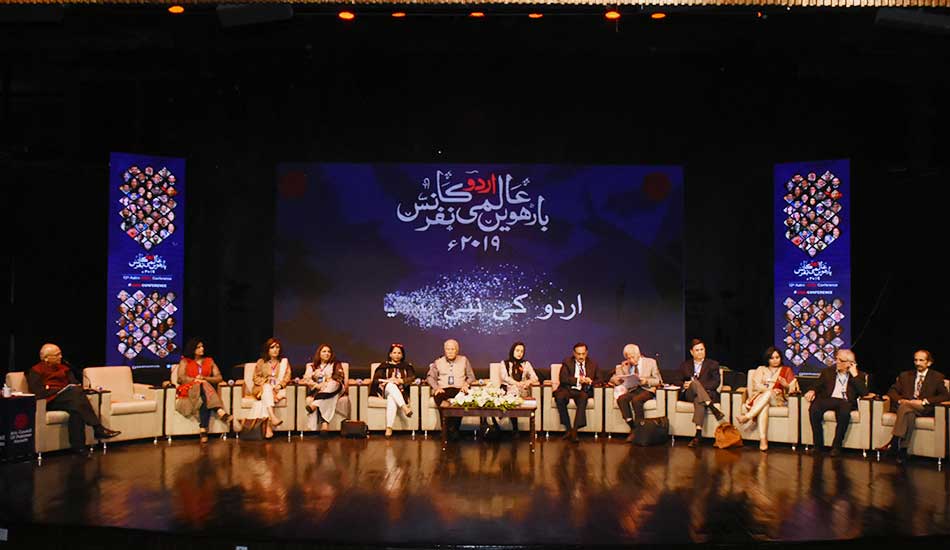
Last week’s aura at Arts Council, Karachi was unlike our regular visits. A surreal serendipity and festive vibe hung over the council, which was made up like a bride – as lovers, admirers and learners of Urdu language congregated together to pay homage to the national language. In its four-day long affair; which was more of a lively festival – the Urdu Aalmi Conference unrolled its 12th edition, paying ode to poets and writers, of era now and bygone. A language as versatile and vast as Urdu, indeed deserved a festival of its own whilst also rendering inclusion to regional languages like Balochi, Sindhi and Punjabi. To savour the adabi zaiqa of the evenings better, food stalls served chapli kebab, chaat, Haleem, and gol gappay adding desi flavours to the night.
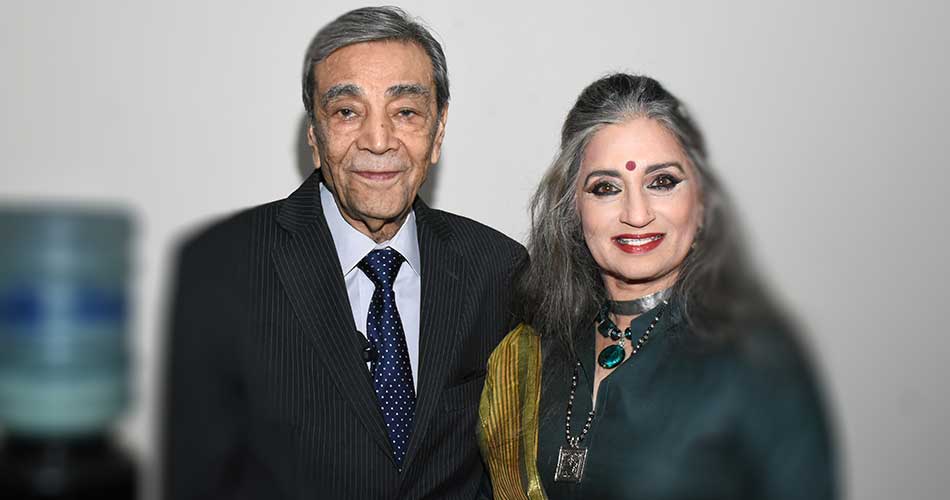
The session featured detailed orations by poets, writers and critics of high merit on the 150th death anniversary of Mirza Ghalib, moderated by Pakistani poetess and journalist Nasira Zuberi. The speakers of the session included Syed Nomanul Haq, Shamim Hanfi, Dr Tahseen Firaqi and Hiroji Kataoka.
International Pakistani scholar and intellectual historian, Syed Nomanul Haq spoke on how Ghalib, being one of a kind, is an epitome for the literary world. According to him, the death of Ghalib, as an eminent poet has been irreplaceable. He was also of the opinion that Ghalib’s poetry regarding the creation of the universe is very divergent.
Dr Tahseen Firaqi, a prominent Pakistani scholar of Urdu, Persian and Arabic, and critic presented his thesis on life and the idea of life that Ghalib presented in his poetry. In Ghalib’s poetry, the relationship between human beings is unbreakable. He stated, “Ghalib has the potential to face the sorrows of this world… He welcomes grief and sorrow with open arms. According to Ghalib, it’s better to face one’s fears than to be afraid of them,” he continued.
Japanese professor of Urdu, Hiroji Kataoka at Daito Bunka University also took part in this prestigious session. He spoke on how commendable Ghalib is and asserted, “Ghalib wrote 2740 couplets when he was just 30 years old.”
Shamim Hanfi, an Urdu critic, dramatist and a proponent of modernist movement in Urdu literature from India also expressed his views regarding Ghalib. According to him, Ghalib is the kind of poet who has been accepted universally. He said that, “There is no poet like Ghalib in either India or Pakistan, to date.” Stating that he has come across so many poems penned down by a lot of great poets of their time but no poet has influenced him the way Ghalib has. “His poetry has been a constant support for me,” he continued. He ended the session on a couplet by Ghalib,
Roz iss shahr mein aik hukm naya hota hai,
Kuch samjh mein nahin aata hai k kya hota ha
The session featured poems of Mirza Ghalib from his famous poetry book Diwan-e-Ghalib read by the acclaimed British-Pakistani actor, producer, director and broadcaster, Zia Mohyeddin. To make the session all the more remarkable, Music Head and Sitarist of National Academy of Performing Arts (NAPA) Ustaad Nafees Khan along with his students also narrated a few lines of Ghalib’s poetry on the tunes of his sitar. – Alina
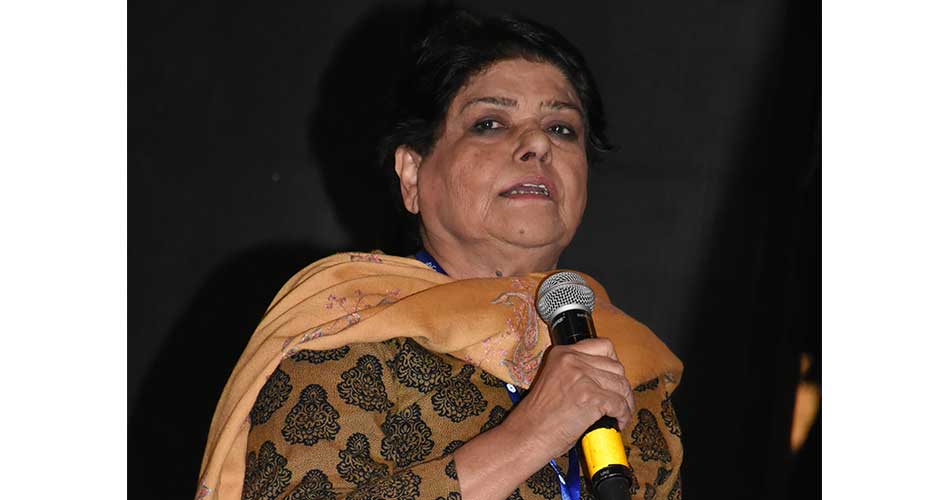
Kishwer Naheed ki koi beti nahi,
Lekin ussey beti ki maa banna aata hai.
Kishwer Naheed akeeli hai,
Lekin sath dena jaanti hai.
Dr Najeeba Arif introduced the feminist Urdu poetess with verses stirring with emotion. It would be a disservice to the burgeoning flames of feminism in Pakistan without the mention of Kishwer Naheed. A woman way ahead of her time; who surmounted each patriarchal trench with thrilling bravado. Eye-witness to the sexual violence and abduction of women during the partition of India, Kishwer admits it left a lasting impression on her. Her 12 volumes of poetry echo her struggle as a woman whose eyes witnessed the rise and fall of martial law, the harrowing incidents happening to young girls and what it felt to be left bereave of all rights. With bated breath I waited for her to recite her famous poem We Sinful Women, which has been revolutionary as a women’s anthem among Pakistani feminists. – Attiya
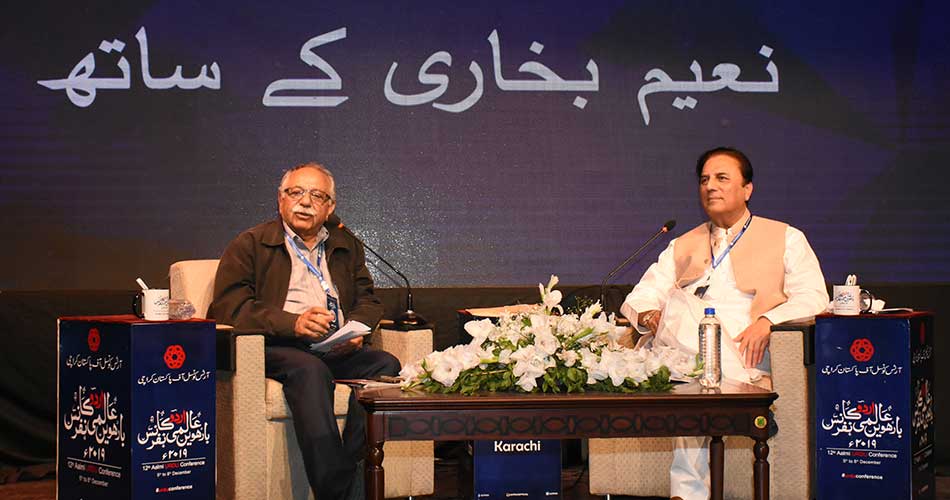
Naeem Bokhari, a renowned lawyer and media personality, spoke in a one-on-one discussion with host and veteran actor, singer and composer Arshad Mehmood. The hall echoed with fits of laughter, courtesy of Bokhari’s great sense of humour. The focus of the conversation was Munnu Bhai who was a power house of talent; print journalist, columnist, writer, were namely a few of his gifted flairs for which we received multiple accolades crediting his literary contributions to the Urdu language. Reminiscing, the speakers fondly remembered some of his drama serials Sona Chandi, Dasht, Tammanna and more. He always wrote with purpose and to create awareness among the masses and to kindle hope among them even in the worst of circumstances. His immense contribution to Urdu will always cast one's mind back to the golden era where substantial content of Urdu literature was produced in abundance. During the session, Naeem Bokhari exchanged views about his close and affectionate relationship with Munnu Bhai. He recalled his witty persona and the wisdom the late writer shared freely. Narrating the late writer’s masterpiece Punjabi poem, Bokhari shares with his audience with awe, the poetic skills he left the world with. Continuing about his experiences in life and shedding light on different events, be it his education, work or his connectivity with art, Bokhari’s eloquence is gripping. “People lack tolerance nowadays, it’s very important for us to learn how to be tolerant and smile till we can,” he closed. – Rubab
Bareeda hain sare bazaar tou kya
Bhala andhon se parda kyun karain – Jaun Elia
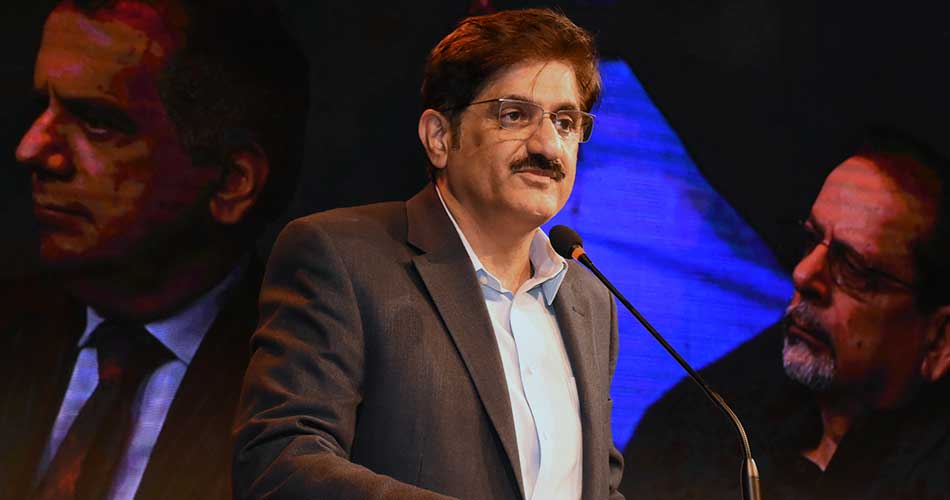
Every time a conversation has started on freedom of expression in art, we come across the same contributions that the boundaries within which an artist has to work are choking. In a panel discussion moderated by Huma Mir on this subject with renowned writer Samina Nazir, artist-cum-activist Shahid Rassam, Karachi Bienalle curator Muhammad Zeeshan and art gallery owner Abid Merchant, activists from the field share their thoughts on freedom of expression in Pakistan. The common misconception is that lack of freedom to create and express exists in Pakistan alone but they share this is a global phenomenon. One problem with communicating in artwork is the interpretations are dependent on the recipient, while the artists message, or better said ‘questions’, may be different, they can fall prey to self-concluded misconceptions which makes them the subject of severe criticism and scrutiny. But does that force an artist into a box? Samina Wazir, famed for her bold stories on womanhood, says the calling of art gives the artists the strength to keep going, to cope with the criticism. Nazir says stories and characters find you like an epiphany and will linger till their story is told. In the pen might be the strength to change the world but it is also a source of strength and courage to write what should be written. Continuing, Abid Merchant shares that a book was written on the life and works of fellow panelist Muhammad Zeeshan; after it was printed, they were cautioned by the press that either the book will be burnt or the press if this was launched. A later version was heavily censored and launched. But the panelists agreed in unison that despite censorship, the battle was not lost because a conversation was initiated. Nazir weighs that the purpose of art is to ask questions, to provoke a thought and the backlash that certain expressions receive highlight them at a much larger scale. Pointing at Adeela Suleman’s installation, without the incident that occurred, it may have gone unnoticed. – Eman
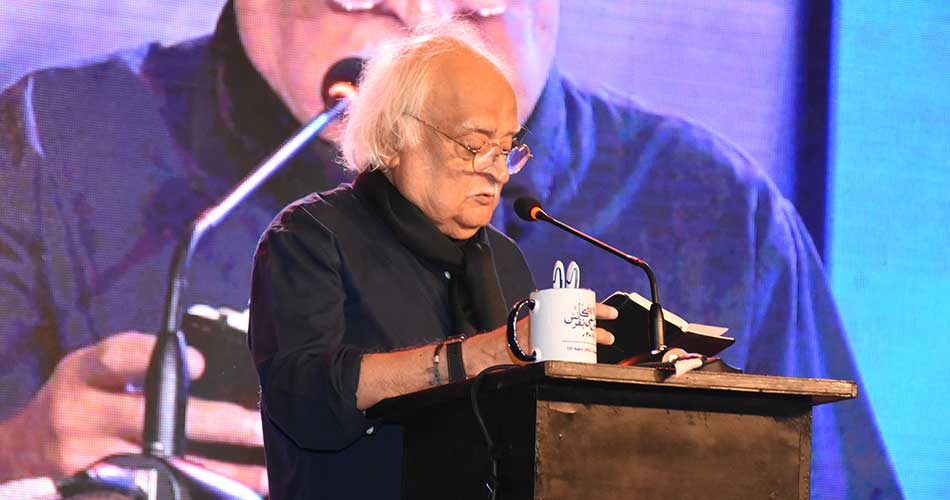
COMMENTS